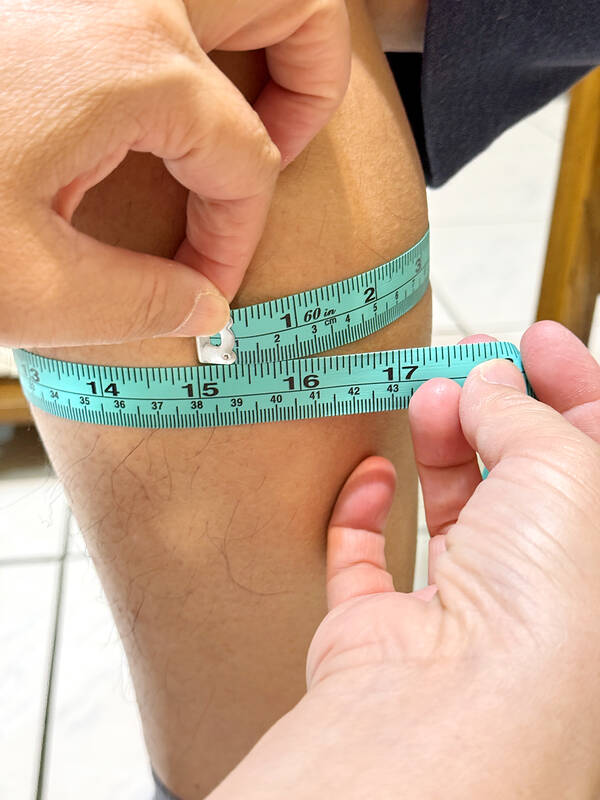Those older than 40 years old should make sure they get a sufficient amount of exercise, food and sun exposure to avoid sarcopenia, a medical researcher said on Sunday.
After the age of 40, muscle mass begins to decline, which can lead to sarcopenia — a loss of muscle mass, strength and function — which raises the risk of falls and fractures, National Taipei University of Nursing and Health Sciences assistant professor Wang Hsiao-ping (王曉萍) said.
Sarcopenia is a common but often overlooked problem among older adults, particularly when combined with poor nutrition and lack of physical activity, which can accelerate loss of mobility and independence, she said.

Photo courtesy of Wang Hsiao-ping
Wang said the condition typically appears in people older than 60, but might develop earlier among those with chronic diseases or sedentary lifestyles.
Many with sarcopenia might not even know they have the condition, but a simple way to check for it is to form a circle around the thickest part of your calf using the thumbs and index fingers of your two hands, she said.
“If there is a gap between your fingers and your leg, it could indicate possible sarcopenia,” Wang said.
Another method is to sit with your knees bent at a 90° angle and measure around the thickest part of your calf using soft tape, she said.
Men with a circumference smaller than 34cm and women with less than 33cm are in a high-risk group, Wang said.
Exercise is the best way to delay muscle loss, she said, recommending that people do resistance training, such as squats, elastic band exercises or weight training two to three times per week.
This should be complemented by 150 minutes of moderate aerobic activity weekly, such as brisk walking, swimming or cycling, to improve cardiovascular health, Wang said, adding that balance exercises such as taichi and yoga can also reduce the risk of falling and help seniors stay mobile.
“Diet plays an equally important role. For those without medical restrictions, protein intake should reach 1.2g to 1.5g per kilogram of body weight per day, evenly distributed across three meals,” she said, citing fish, chicken, eggs, soy products and dairy as good sources of protein.
Vitamin D and calcium are also key to maintaining strong bones and muscles, and can be obtained from foods such as fish, eggs, tofu and milk, Wang said.
Omega-3 fatty acids from salmon and nuts help reduce inflammation and support muscle function, she added.
Wang cautioned against diets consisting only of starch or vegetables, as it could lead to malnutrition and muscle loss.
“Sunlight exposure also helps strengthen bones. Sunlight enables the body to produce vitamin D, which boosts immunity, supports bone health and improves sleep quality,” she said.
However, people should avoid the intense midday sun and instead expose their arms and legs to sunlight for 15 to 30 minutes before 10am or after 4pm, while taking appropriate skin protection measures, she added.

ALIGNED THINKING: Taiwan and Japan have a mutual interest in trade, culture and engineering, and can work together for stability, Cho Jung-tai said Taiwan and Japan are two like-minded countries willing to work together to form a “safety barrier” in the Indo-Pacific region, Premier Cho Jung-tai (卓榮泰) yesterday said at the opening ceremony of the 35th Taiwan-Japan Modern Engineering and Technology Symposium in Taipei. Taiwan and Japan are close geographically and closer emotionally, he added. Citing the overflowing of a barrier lake in the Mataian River (馬太鞍溪) in September, Cho said the submersible water level sensors given by Japan during the disaster helped Taiwan monitor the lake’s water levels more accurately. Japan also provided a lot of vaccines early in the outbreak of the COVID-19 pandemic,

Kaohsiung Mayor Chen Chi-mai (陳其邁) on Monday announced light shows and themed traffic lights to welcome fans of South Korean pop group Twice to the port city. The group is to play Kaohsiung on Saturday as part of its “This Is For” world tour. It would be the group’s first performance in Taiwan since its debut 10 years ago. The all-female group consists of five South Koreans, three Japanese and Tainan’s Chou Tzu-yu (周子瑜), the first Taiwan-born and raised member of a South Korean girl group. To promote the group’s arrival, the city has been holding a series of events, including a pop-up

TEMPORAL/SPIRITUAL: Beijing’s claim that the next Buddhist leader must come from China is a heavy-handed political maneuver that will fall flat-faced, experts said China’s requirement that the Dalai Lama’s reincarnation to be born in China and approved by Beijing has drawn criticism, with experts at a forum in Taipei yesterday saying that if Beijing were to put forth its own Dalai Lama, the person would not be recognized by the Tibetan Buddhist community. The experts made a remarks at the two-day forum hosted by the Tibet Religious Foundation of His Holiness the Dalai Lama titled: “The Snow Land Forum: Finding Common Ground on Tibet.” China says it has the right to determine the Dalai Lama’s reincarnation, as it claims sovereignty over Tibet since ancient times,

Temperatures in some parts of Taiwan are expected to fall sharply to lows of 15°C later this week as seasonal northeasterly winds strengthen, the Central Weather Administration (CWA) said today. It is to be the strongest cold wave to affect northern Taiwan this autumn, while Chiayi County in the southwest and some parts of central Taiwan are likely to also see lower temperatures due to radiational cooling, which occurs under conditions of clear skies, light winds and dry weather, the CWA said. Across Taiwan, temperatures are to fall gradually this week, dropping to 15°C to 16°C in the early hours of Wednesday